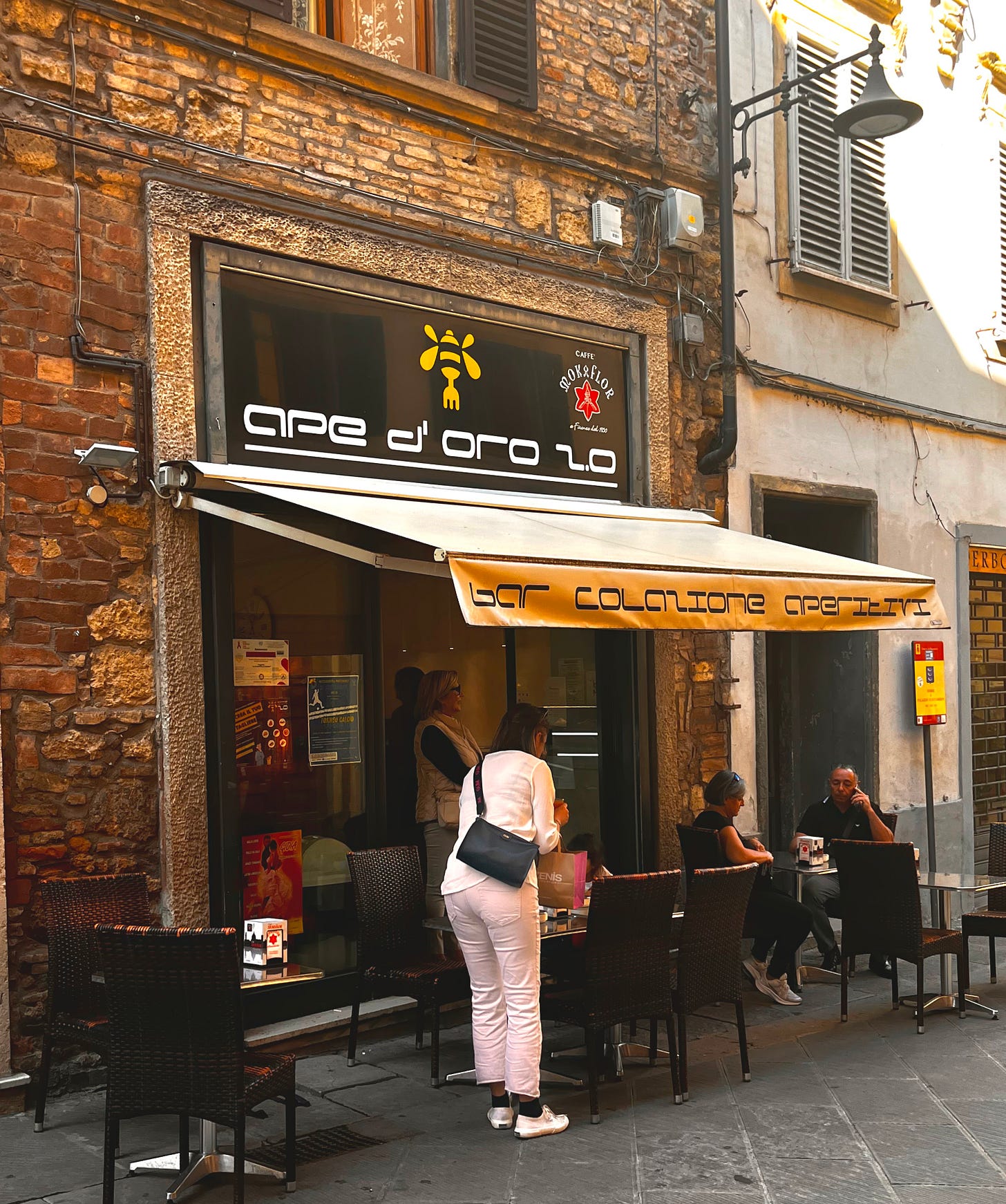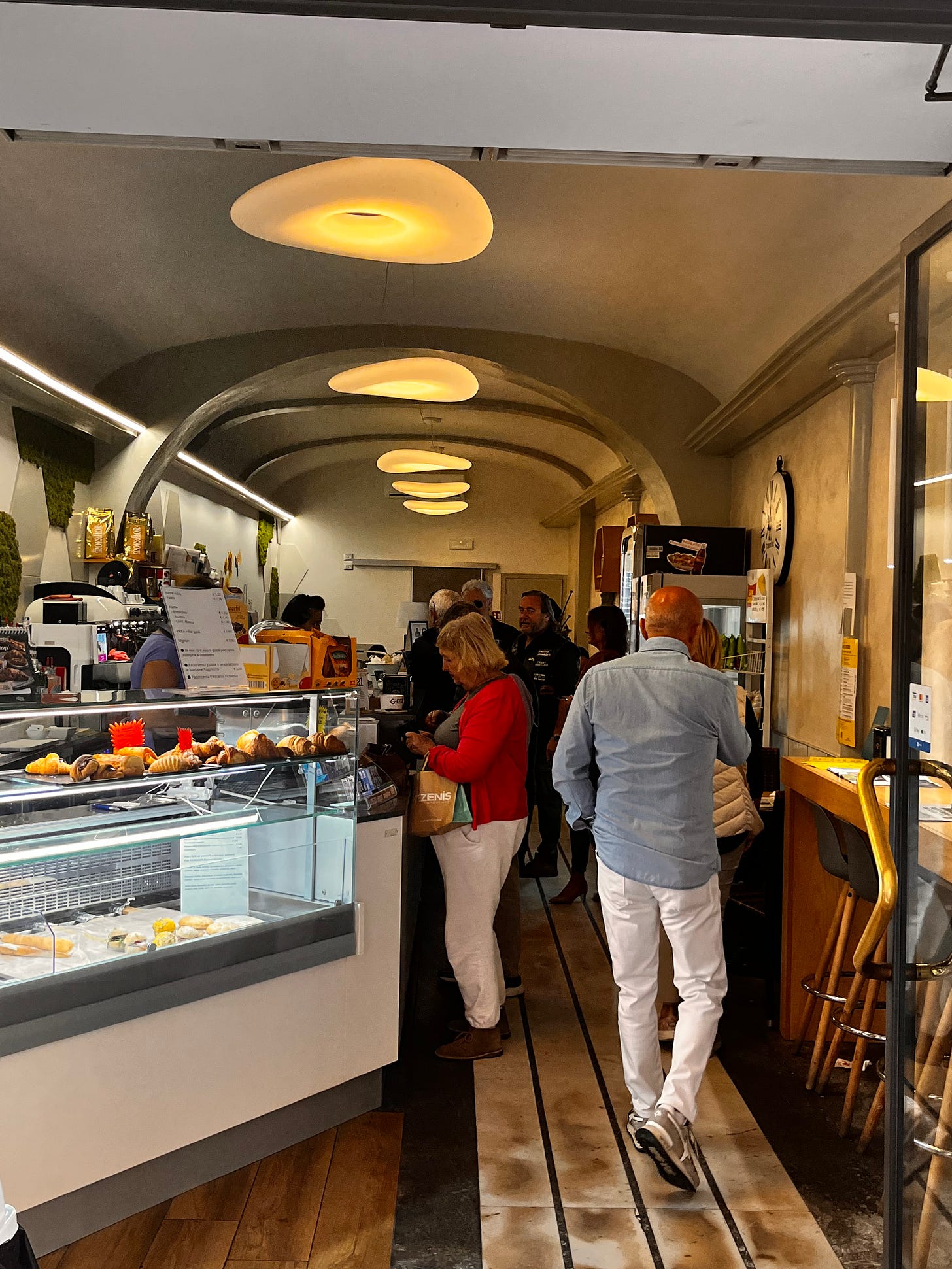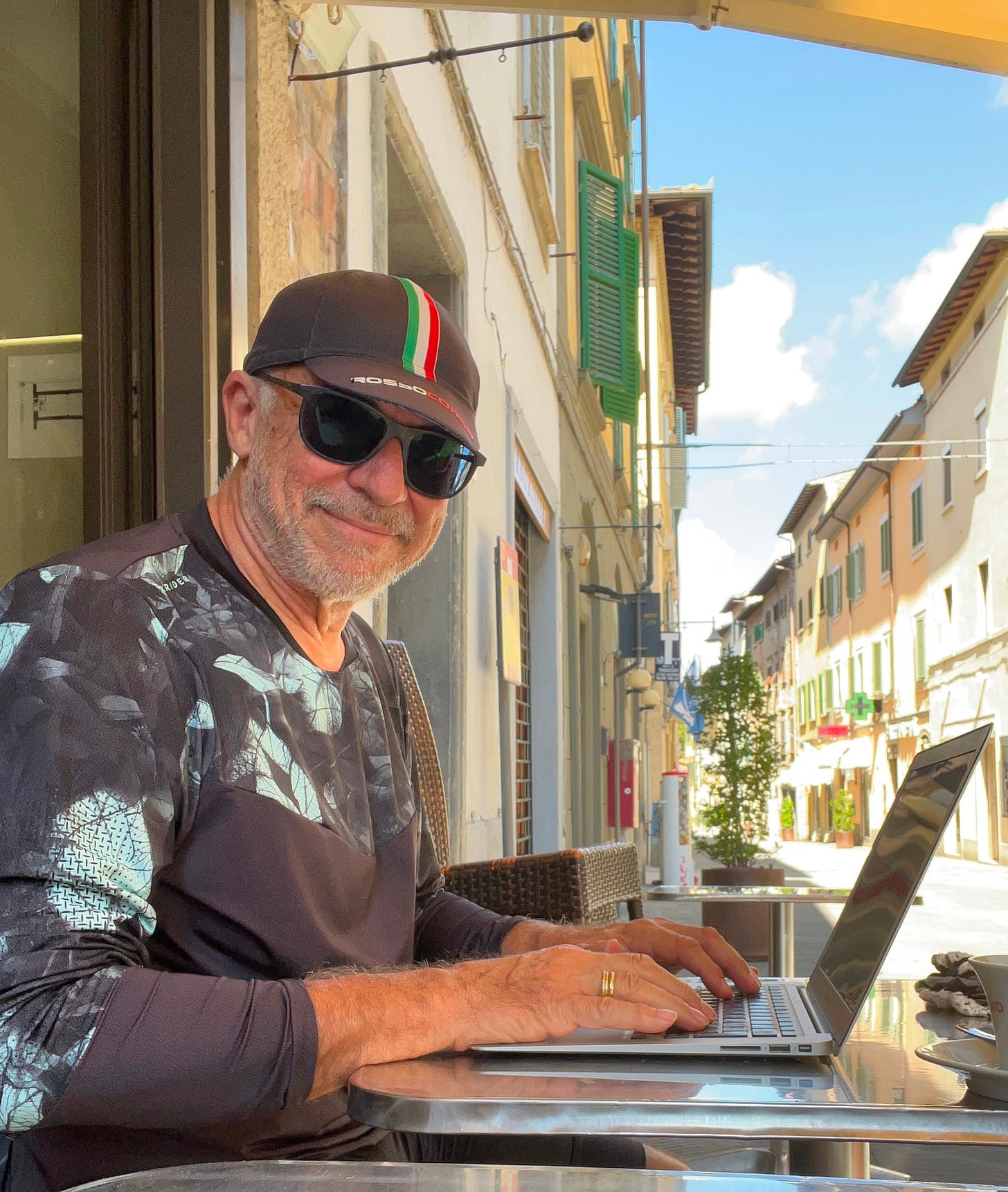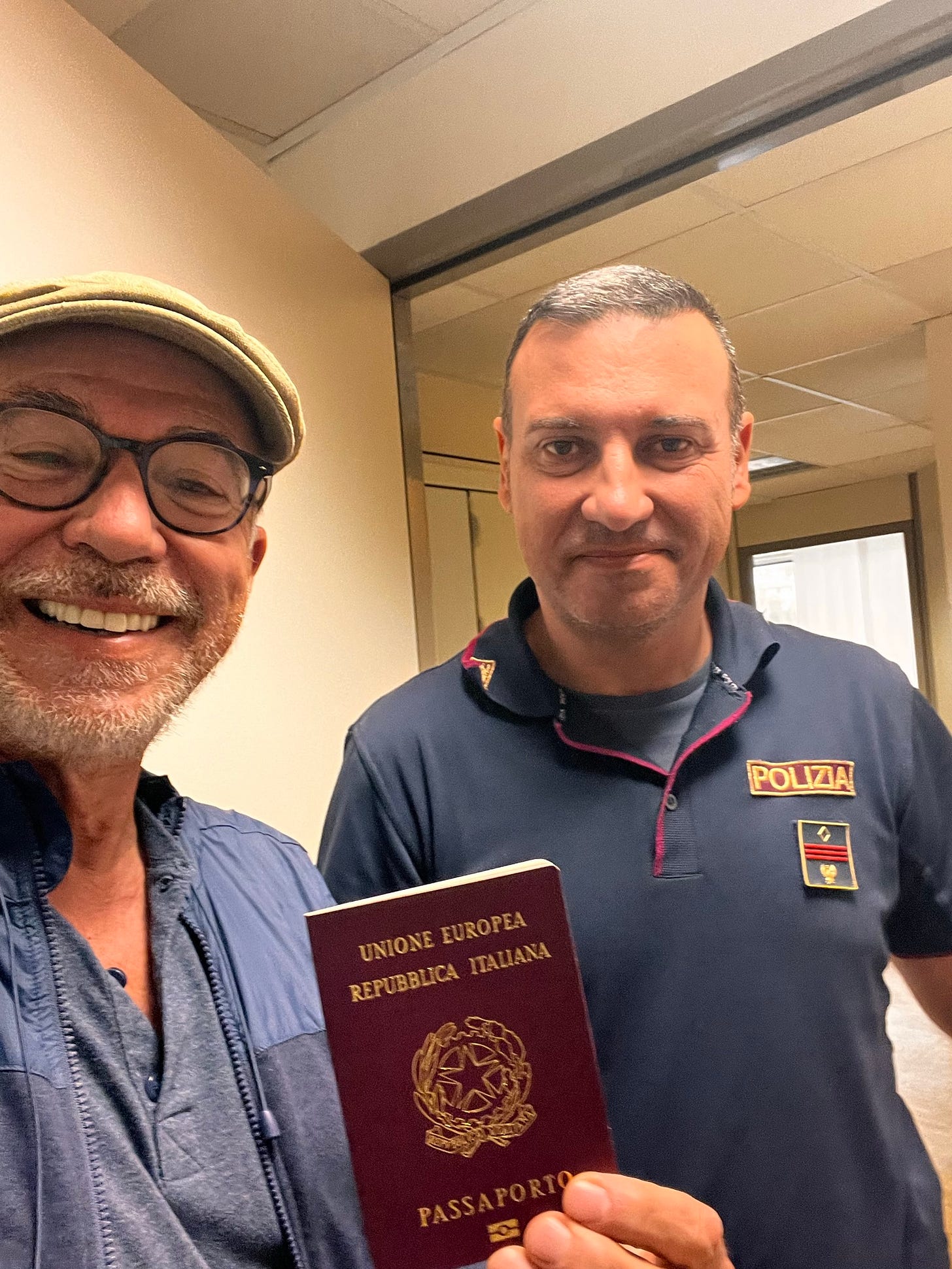La “burocrazia” bureaucracy in Italy is like a fine wine, aged to perfection, but you'll be waiting forever to taste it.
I’m writing this week’s newsletter from Bar Ape d’Oro in Poggibonsi. I purposely chose this town because it’s where I’m officially registered as an Italian resident. Today’s drink of choice? Chamomile tea, because if you’re dealing with Italian bureaucracy, you either need Zen-like patience or at least the illusion of it. In Italy, chamomile (camomilla) is the nonna-approved cure-all for everything. Stressed? Chamomile. Ate too much pasta? Chamomile. Kids won’t sleep? Chamomile. Italians swear by its magical ability to calm nerves, aid digestion, and induce a deep slumber. It’s the ultimate Italian grandmother’s secret weapon.
The bar on Via della Repubblica has all the hallmarks of small-town Italian life. On this Saturday morning, the street is alive with residents strolling from shop to shop, many stopping for a quick caffè and a chat. I love this atmosphere, couples holding hands, friends calling out enthusiastic greetings: “Ciao ragazzi, buona domenica!” (Yes, they’re already wishing each other a good Sunday, a day in advance.) One man on his phone repeats “ciao, ciao, ciao…” at least ten times before finally hanging up. Why do Italians need so many “ciaos” to say goodbye? A mystery for another day.
Let’s Talk Bureaucracy
When I decided to retire in Italy, I knew there would be hoops to jump through: obtaining Italian citizenship, a permesso di soggiorno (residence permit), a new passport, codice fiscale (social security number), a Tessera Sanitaria (health card), a bank account, and, of course, an Italian driver’s license. Simple, right? Little did I know, Italy has turned bureaucracy into an Olympic event. You need to train for it, mentally and physically.
This isn’t a complaint about the country I was born in and love. However, after 58 years in Canada, I’ve been shaped by a different way of doing things. So, consider this a light-hearted critique from someone who’s spent the last two years navigating the bureaucratic labyrinth and reacquainting himself with local customs.
Leasing a House
Conversation with a real-estate agent:
- Buongiorno, Signor Valli. My name is Tino Masecchia. I’m calling about the house you listed for rent in Colle Val d’Elsa. I’m interested. Is it still available? Would it be possible to visit?
- Buongiorno, Tino. Sì, sì, it’s available. When would you like to visit?
- Tomorrow.
- Domaniiiiiiiiiii? You should have called me last week if you wanted to visit tomorrow!
- Is it not possible? I’m going back to Canada next week and I’d like to finalize it before I leave. I said
- But it’s harvest time! I can’t show you the house this week.
- But… aren’t you the agent?
- Of course! What’s your point? Call me next week before you leave. There’s nothing I can do now; it’s harvest time. Mi dispiace (I’m sorry). End of conversation.
I eventually found a house, thanks to word of mouth, not grape-loving realtors. Signing the lease was an epic journey of its own. The landlady hired a lawyer to draft a six-month lease, insisted on registering it, (lengthy and costly legal procedure) and subjected me to more scrutiny than when I applied for a mortgage in Montreal. It took from November to April to finalize, one week before I took possession. Signing the lease for my house in Montreal took me exactly one hour. I filled out a form, handed it over to the tenant for a signature, and we were done. My Italian landlady was baffled when I told her this.
Italian Citizenship
Regaining my Italian citizenship was a priority. I met all the requirements at the Italian Consulate in Montreal, where they were super-efficient. But once my paperwork arrived in Poggibonsi, everything derailed. For three months, they claimed they had never received my file. A call back to Montreal confirmed they had received it, right down to the exact date and time they opened the email. When I relayed this to the authorities in Poggibonsi, suddenly the file was “found.” Curious how that works.
I was shuffled between offices with little coordination and a lack of interest in addressing the issue. Some told me I needed a residence permit while waiting for my citizenship, while others said I didn’t. In the end, I consulted an emigration lawyer who confirmed that I did. Meanwhile, months passed, and there was no progress on my citizenship. Back to city hall I went, only to be told that since the file originated from Montreal, only Montreal could send the request to the Questura. (main office of state police) Precious months were wasted because someone couldn’t be bothered to read their emails, or not doing their job properly due to apathy.
Finally, a year and nearly a thousand euros in fees later, I got an email: “Congratulazioni Signor Masecchia, siete un cittadino Italiano” “Congratulations, you are now an Italian citizen.” For a brief moment, I forgot all the headaches and was happy to have survived it all.
Oh, and by the way, today, I got an email from la Questura saying my permesso di soggiorno is ready to be picked up. Who needs it anymore? I have my Italian citizenship now! Gee, thanks.
I was finally allowed to have an Italian passport and a family doctor. And I’m happy to say this process was a breeze. Within 48 hours, I was sitting with Dr. Frosali, who spent 45 minutes chatting with me about everything and not only my medical condition. He even gave me his cell number and signed up for my Substack newsletter! This experience was unlike anything I had encountered before. The doctor getting to know his new patient on a personal level felt like a vital first step toward better treatment and prevention.
Getting my passport? It only took five days. And the police officer kept the office open just for me after I called to let him know I’d be 20 minutes late.
The Post Office
Poste Italiane isn’t just for mailing letters, it’s also where you handle government paperwork, pay bills, and even return Amazon packages (in any condition, it seems). The employees, however, seem to be the only ones relaxed. Personal conversations between tellers and clients are a daily ritual. With at least ten people ahead of me, I overhear a customer passionately recounting how their cat’s all-night illness ruined dinner. And just when I thought that was over, the next teller starts a lively discussion about the sudden cold snap, lamenting the need to dig out winter clothes in September. Exciting stuff, while my blood was boiling.
Once, I was number 64, and they were serving 35. With fewer than ten people in the room, the math didn’t add up. I asked a gentleman next to me what was going on. “Oh, people grab a number, run errands, and come back later,” he explained. Naturally! Why stand in line when you can grocery shop?
The Driver’s License
After a year of residency, my Quebec license was no longer valid. Without a reciprocity agreement between Canada and Italy, I had to start from scratch, driving classes, theory tests, the works. Although many of my friends thought this was good for me, and for their own safety when they were in the car with me. The hefty price tag of 980 euros included a second test. When I asked why, the lady at the driving school explained that most people flunk the first test, so they automatically include the cost of the second test. After my first few online classes, I understood why the success rate is so low. The questions are tricky, more like an IQ test than a driving exam.
My integration into the Italian system and abitudini di vita (lifestyle) is getting much better. That said, let me share some things I’ve found weird or even amusing compared to Canadian standards.
- Punctuality: When someone tells you, “I’ll see you in 5 minutes,” it means, “I’ll see you sometime soon.” Very relaxed approach to time.
- Bluntness: No filters when expressing their opinions. If you go to lunch at 3 PM, a waiter might sarcastically say: “Ma è un’ora questa per pranzare?” (“Is this a time to be having lunch?”)
- Scrutinizing: When buying soccer game tickets, you need to show IDs for all participants, and the tickets are personally assigned to them. You can’t decide at the last minute to bring your son instead of your wife, for example.
- Weird rules: In a condo building with an elevator, the residents on the first floor don’t pay for the cost and maintenance of the elevator because they don’t use it. Logical? Maybe. But it complicates things.
- Simplicity is rare: Receipts for goods and services aren’t acceptable for income tax purposes, you need the merchant to provide “una fattura” (an official tax receipt), which is lengthy and bothersome, especially for the provider.
The list is quite long but this gives you a taste of Italy everyday living. One evening over an espresso at the local bar I was recounting this story with my girlfriend and was comparing lifestyles between Italy and some other countries and she said: “Ma che hanno invetato I Svizzeri altro l’orologio a cucu, e il cioccolato al latte? What have the Swiss invented other than the coo-coo clock and milk chocolate? I laughed because it was her way of saying, “Italy is complicated, but you know you love it here.”
Arrivederci until next Saturday—always observing, always sharing, always sipping, always a tale from an Italian coffee bar and beyond.













Tu m’a bien fait rire lorsque tu dis que ton docteur s’est inscrit à ton infolettre Substack! C’est un délice de te lire. 🙋♀️
Thank you Tino! I thoroughly enjoyed this! Your description is quite humorous but nonetheless it represents the reality. Italy will always be Italy! A GEM ❤️